As we age, most of us don’t have the same vibrant social lives we did when we were young. In fact, approximately 50% of adults over 60 years old are more at risk for social isolation. (1) If you’re a senior who is experiencing isolation (or a loved one of someone who is), this article is for you.
We’ll discuss what senior isolation is and provide some useful tips for sleeping better despite being isolated. Along the way, we’ll talk about how COVID-19 has exacerbated isolation for seniors.
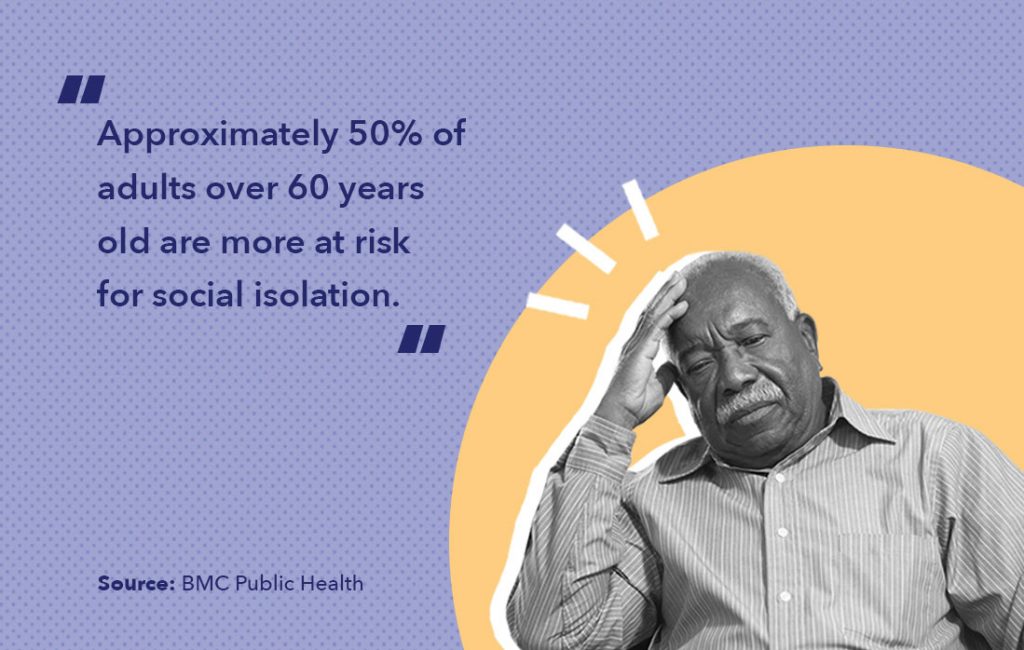
Note: The content on Sleepopolis is meant to be informative in nature, but it shouldn’t take the place of medical advice and supervision from your healthcare provider. If you feel you may be suffering from any sleep disorder or medical condition, please see a trained medical professional.
What is Senior Isolation?
You may be tempted to think that loneliness and isolation are the same thing, but they’re not. Research has shown that social isolation is the physical separation from others, such as living alone, while loneliness is the negative feelings that come from separation from others. Just like some folks can feel lonely even if they’re in a crowded room, others who live alone may not feel lonely. (2) There is, however, a link from one to the other. While the two are not the same, social isolation can cause loneliness. (3) Let’s dive into how senior isolation affects sleep, and what you can do about it.
Senior Isolation and Sleep
If you’re a senior who suffers from social isolation, you are more likely to experience insufficient sleep. (4) This is likely due, in part, to how social isolation puts you at a higher risk of anxiety and depression — both of which can negatively impact sleep.
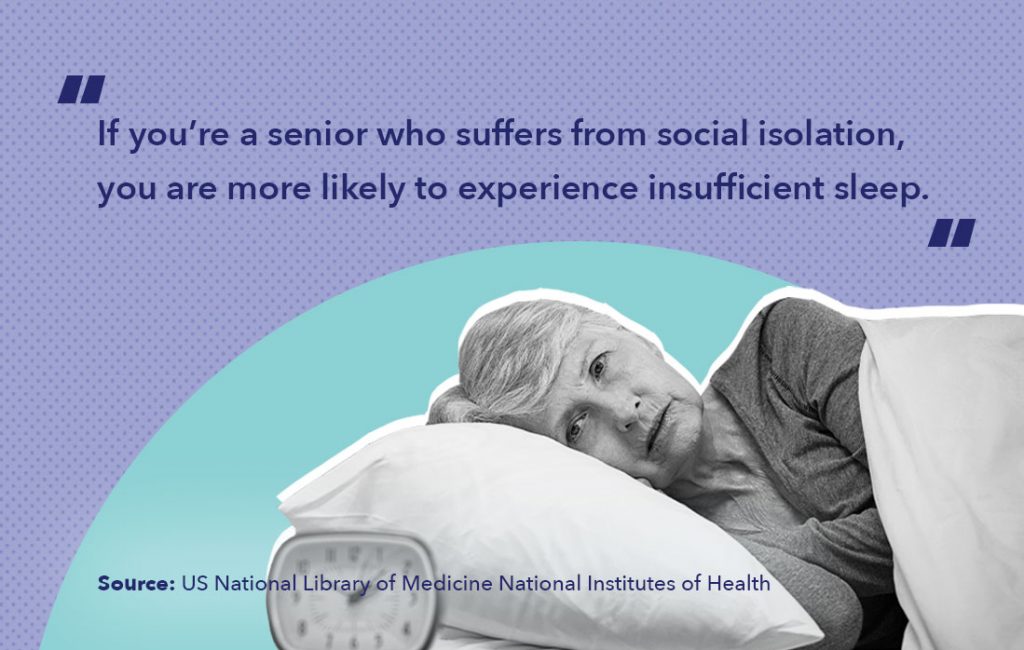
In contrast, having social support can help you sleep better. Support differs from simply having friends or relatives around you — you’ll only experience positive effects from healthy social interactions that don’t increase your stress levels. You don’t want those argumentative relatives around who make you feel anxious or depressed.
Senior isolation has also been linked with an increase fatigue and depression. (5) To make matters worse, decreased sleep that comes from isolation can accelerate aging in the brain and heart. (6)
But fear not, seniors, for there are ways to sleep better!
How to Sleep Better
To get better shut-eye, you can start by reducing the negative effects of social isolation. Here are a few tips for doing so.
Get around people (if possible)
Provide support to friends, family, and neighbors. (7) You may be able to offer to go grocery shopping, clean, or cook a meal for them. According to mental health experts, having a sense of purpose can help us feel better about ourselves.
Use technology
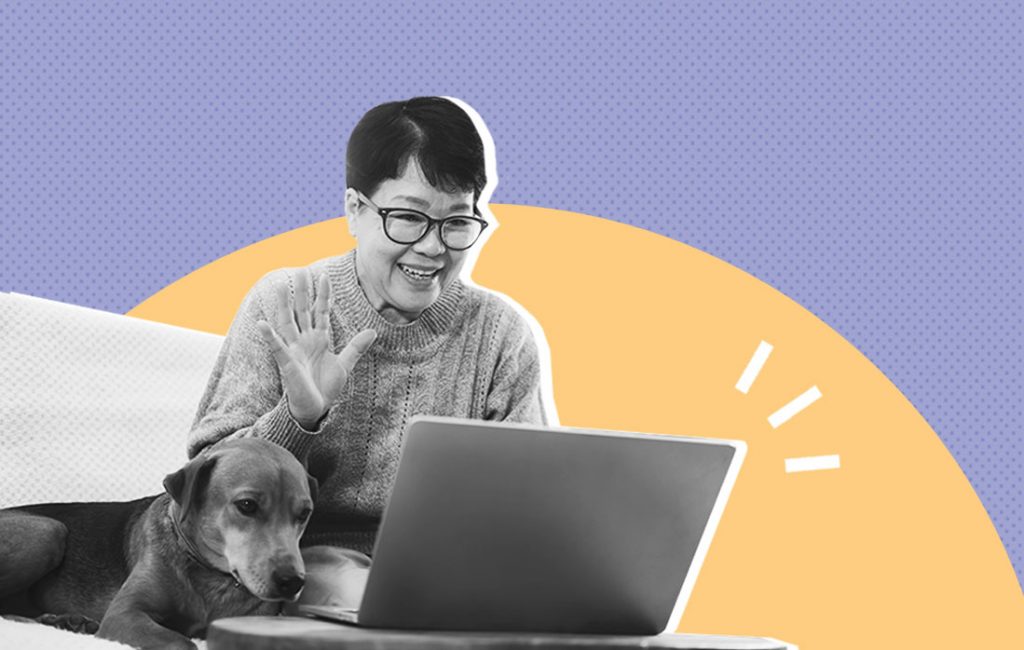
Technology, such as social media or devices that allow a senior to have virtual visits with family and friends, such as FaceTime, can also help. (8) Don’t have access to a smartphone? There is also a positive impact from just having a telephone conversation. (9)
While perhaps not as good as face-to-face communication, these devices do provide enough interaction to help boost serotonin levels in your brain that help regulate your mood.
Change how you think
Researchers suggest that seniors who experience negative thoughts because of social isolation should attempt to change these into something more positive in order to reduce the harmful impact of isolation. (10) Easier said than done, but it’s worth considering.
Join an exercise class
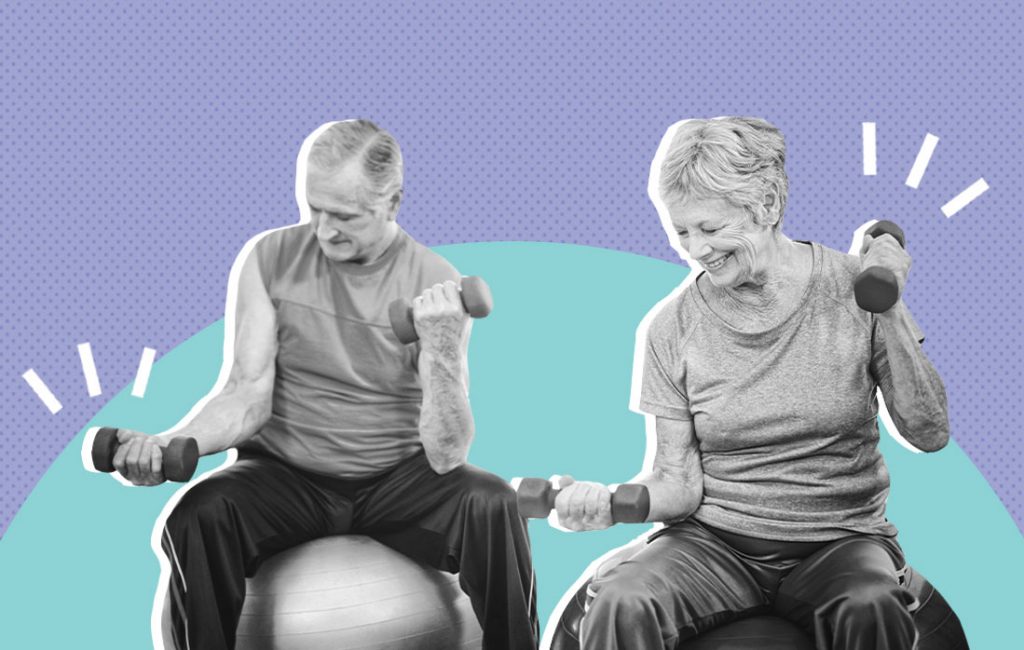
Partaking in an exercise class, such as water aerobics, is another way you can sleep better and decrease social isolation. First off, it can help with social isolation by getting you around others. These classes can also help with sleep by exerting your body so that you’re nice and tired at the end of the day. (11)
Start an adult coloring book
Registered art therapist and licensed mental health counselor, Erica Curcio, specializes in the treatment of seniors and persons with dementia. She explains that the simple act of coloring has the potential to create a quiet moment of zen for some people. She adds, “In this moment of zen, anxiety and depression can momentarily slip away, which in turn allows our body to relax. When we are relaxed, we sleep better.”
Practice good sleep hygiene
Sleep hygiene refers to your pre-sleep practices and the setting of your sleep environment. Good sleep hygiene, like personal hygiene, promotes better overall health. Here are a few basic sleep hygiene practices you can follow to sleep better:
- Follow a regular sleep/wake schedule — By going to bed and waking up at the same time every day, you can train your body to know when it’s time to sleep, which reduces nighttime restlessness. Make sure to choose a time to go to sleep and wake up that will get you 7 to 9 hours of sleep.
- Wash your bedsheets weekly — Clean sheets can reduce allergens and microbes in your sleep environment. This will help you breathe easier, which leads to sounder sleep.
- Avoid caffeine after 3 pm — Drinking caffeinated beverages later in the day can make it harder to fall asleep.
- Find the right mattress for you — Sleeping on the wrong mattress can lead to aches and pains, which make it hard to fall and stay asleep.
Since senior isolation can disrupt your sleep, you’ll want to do what you can to maximize your chances of sleeping better and avoid exacerbating any sleep issues. That’s why it’s best to practice good sleep hygiene.
Senior Isolation During COVID-19
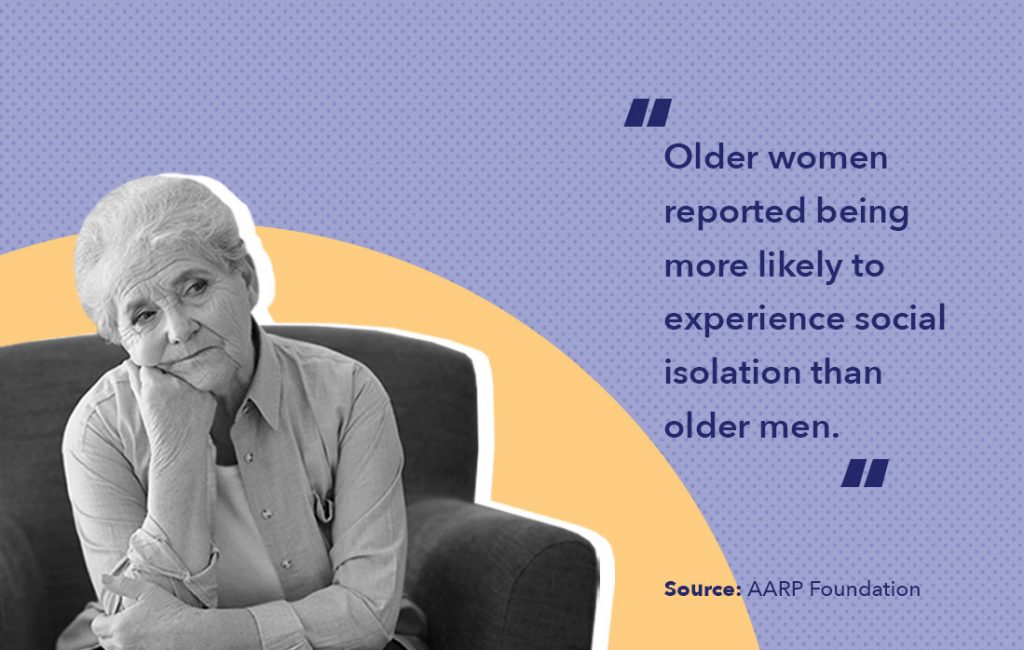
Older people reported having negative mental and physical health effects because of social distancing for COVID-19. Some of these effects include poor sleep quality, depression, physical inactivity, and anxiety. (12)
In fact, approximately 61% of adults over 50 reported experiencing social isolation due to the pandemic. And older women reported being more likely to experience social isolation than older men. (13)
To combat the negative effects of social isolation during the pandemic, experts recommended that those impacted consider volunteering where possible and accessing the resources available from the aging services network. (14) This network refers to the federal, state, and local agencies that provide services to help older adults through community-based services and opportunities. (15)
Other popular methods for mitigating social isolation during the pandemic included going for a walk around the neighborhood, visiting family and friends, or sitting down at a restaurant when it was deemed safe to do so. Using technology with video-conferencing and social media capabilities also helped generate connection — a method that continues to be a great way to stay in contact with loved ones. (16)
Since COVID-19 restrictions have eased, seniors have experienced less senior isolation and social anxiety. Still, there are many seniors who may still be struggling with these issues, and they can still benefit from renewed efforts to spend time with loved ones and connect with their communities.
Last Word From Sleepopolis
Senior isolation can be a difficult and trying experience for many. The pandemic has only made it worse for folks who experience it.
Keep in mind, however, that by getting around folks as much as possible, changing negative thoughts, and joining an exercise class, you can reduce the effects of senior isolation. So, while you may not be able to hibernate through the rest of this pandemic, following these tips may help you sleep better.
Please remember that we are not medical experts, so be sure to speak with your healthcare provider if you have any medical questions.
References
- Fakoya, O et al. Loneliness and social isolation interventions for older adults: a scoping review of reviews. BMC Public Health. Feb 14, 2020.
- “Social isolation, loneliness in older people pose health risks.” National Institute on Aging. Apr 23, 2016. https://www.nia.nih.gov/news/social-isolation-loneliness-older-people-pose-health-risks
- Grossman, E et al. COVID-19 related loneliness and sleep problems in older adults: Worries and resilience as potential moderators. Personality and Individual Differences. Jan 1, 2021.
- McLay, L et al. Loneliness and social isolation is associated with sleep problems among older community dwelling women and men with complex needs. Scientific Reports. Mar 1, 2021.
- Azizi-Zeinalhajlou A, Mirghafourvand M, Nadrian H, Samei Sis S, Matlabi H. The contribution of social isolation and loneliness to sleep disturbances among older adults: a systematic review. Sleep Biol Rhythms. 2022;20(2):153-163. Published 2022 Feb 28. doi:10.1007/s41105-022-00380-x
- Singer, C. Health Effects of Social Isolation and Loneliness. Journal of Aging Life Care. 2018.
- Wu, B. Social isolation and loneliness among older adults in the context of COVID-19: a global challenge. Global Health Research and Policy. Jun 5, 2020.
- Donovan, N et al. Social Isolation and Loneliness in Older Adults: Review and Commentary of a National Academies Report. The American Journal of Geriatric Psychiatry. Dec 2020.
- Office, E et al. Reducing Social Isolation of Seniors during COVID-19 through Medical Student Telephone Contact. Journal of the American Medical Directors Association. Jun 5, 2020.
- “Reducing Loneliness and Social Isolation among Older Adults.” Suicide Prevention Resource Center. 2020. https://www.sprc.org/resources-programs/reducing-loneliness-social-isolation-among-older-adults
- “Study: Exercise Classes Reduce Loneliness, Social Isolation in Seniors.” Cedars Sinai. Nov 12, 2020. https://www.cedars-sinai.org/newsroom/study-exercise-classes-reduce-loneliness-social-isolation-in-seniors/
- Sepúlveda-Loyola, W et al. Impact of Social Isolation Due to COVID-19 on Health in Older People: Mental and Physical Effects and Recommendations. Journal of Nutrition, Health and Aging. Sep 25, 2020.
- “The Pandemic Effect: A Social Isolation Report.” AARP Foundation. Oct 6, 2020. https://connect2affect.org/the-pandemic-effect/
- Smith, M et al. Combatting Social Isolation Among Older Adults in a Time of Physical Distancing: The COVID-19 Social Connectivity Paradox. Frontiers in Public Health. Jul 21, 2020.
- “The Aging Network.” Eldercare Locator. https://eldercare.acl.gov/Public/About/Aging_Network/Index.aspx
- Donovan, N et al. Social Isolation and Loneliness in Older Adults: Review and Commentary of a National Academies Report. The American Journal of Geriatric Psychiatry. Aug 19, 2020.


























